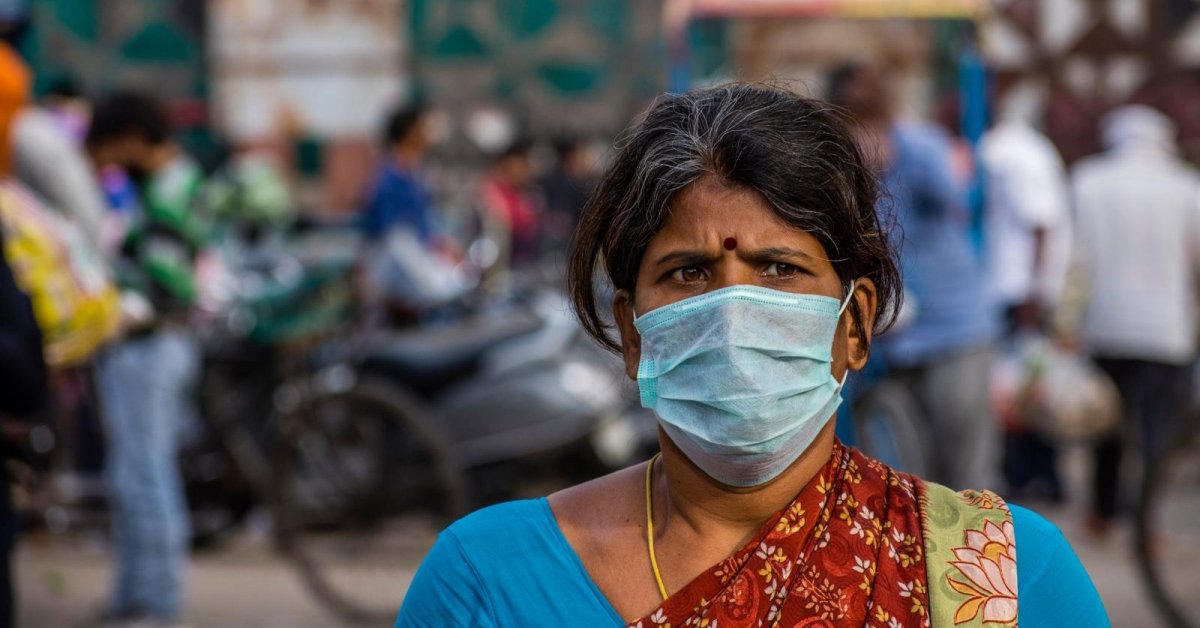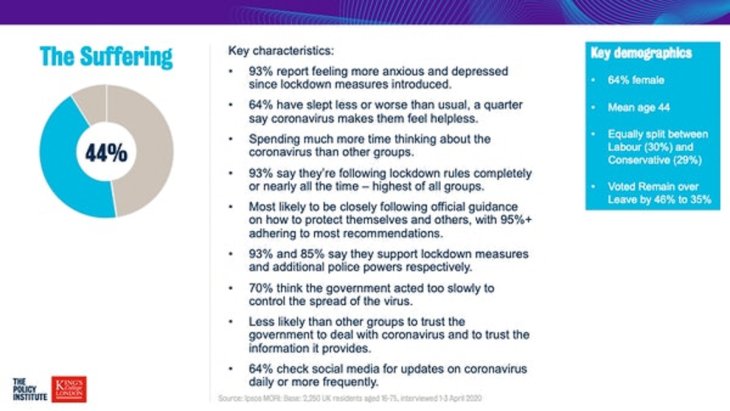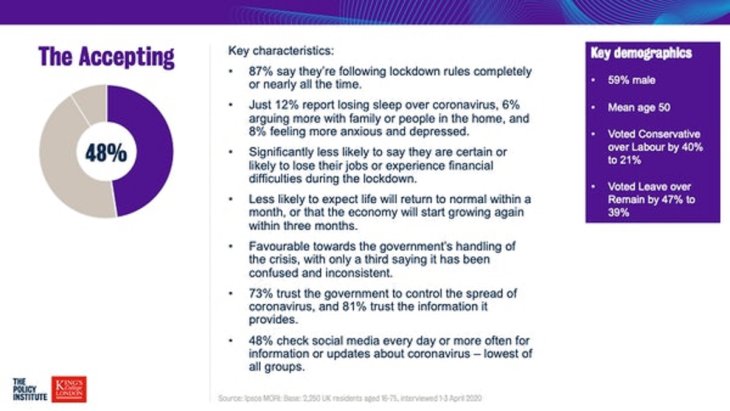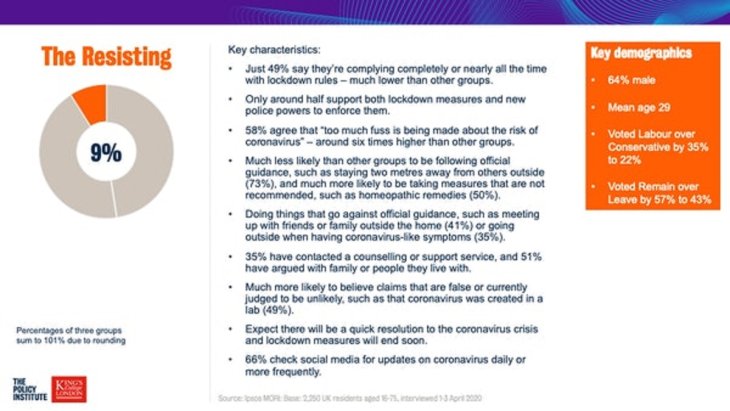There Are Three Types Of People In COVID-19, Which One Are You?
Dhir Acharya - May 09, 2020

With the ongoing COVID-19 pandemic, the world is split into three types of people with three different reactions and responses to measures.
- This Man's Super-Antibody Can Be Diluted 10,000 Times But Still Works Against COVID-19
- These Indian Cities Are Under Lockdown Again In 2021
- India To Review Covishield Vaccine After Report Of Blood Clots Following Vaccination
A new study reveals that 90% of people in the UK support measures to fight COVID-19, of whom 70% strongly support the measures. This is the highest rate ever recorded in the past two decades.
However, while a large part of the population show support for the measures against the pandemic, their influences and people’s attitude vary, as analyzed by the King’s College London. Accordingly, there are three key types of reactions towards the COVID-19 pandemic, Accepting, Suffering, and Resisting.

With some questions, people can be divided into three types based on their experiences of a lockdown during the outbreak. For instance, almost all the Suffering type say that they have experienced more anxiety and depression since the announcement of the measures, as opposed to only 8 percent of Accepting. One-third of Suffering think about the pandemic all the time while the rate is 11% for Accepting.

Meanwhile, Accepting people seem much less likely to experience some major impacts included in the survey. Just 12 percent of them have had less sleep or slept less well during the lockdown while the percentage for the Suffering is 64 percent.
People of the Resisting type have likely argued with their housemates or family, both of whom used non-prescription drugs or drank more alcohol than their normal days.

The Resisting accounts for 9 percent of UK adults, smaller than the other two types, but this still equals to 5 million people. This data is prominent as they view the situation differently from the other two types regarding some of its major aspects, and they behave differently.

The most notable thing about this type is that 60% of them think that people are overreacting to the pandemic. With this in mind, over 30% of them expect like to be normal again after three months, three times that of the others. And only 25% of them strongly support the lockdown measures currently in place, as opposed to 75% of the Suffering and Accepting.
Also, Resisting people more likely believe in conspiracy theories and not assess the spread of the virus. For instance, 50% of them believe the coronavirus may have been created in a laboratory while 60% of them believe most UK people are already infected with the virus without knowing it.
As a result, they performed worse in terms of compliance with the government’s guidance, with 40% saying they have gone outside and gathered with friends while the other two groups hardly did this.

The survey also suggests that the Resisting fear the future influence of the lockdown on themselves. Over 66% of them think they will lose their job and become financially troubled due to the lockdown. This seems in line with them not taking the order seriously with fear of impacts on their personal lives.
It’s worth noting that 50% of this group consists of people aged from 16 to 24. On the other hand, Accepting includes older people with 41% of them at 55 years old. Meanwhile, Suffering includes people of all ages, but mainly women with men making up most of the other two groups. According to the survey, women have higher stress levels, concern about the effect of the ongoing lockdown as well as difficulty sleeping.
The survey also reveals different political supports. While Accepting people are much more likely to support Conservative, Resisting people are more likely to be Labour supporters, and Suffering people are most likely to support Remain.
Studying people’s different reactions and responses to the pandemic helps governments and officials come up with strategies to increase compliance with measures against COVID-19 as well as to make better plans.
Featured Stories

Features - Jan 29, 2026
Permanently Deleting Your Instagram Account: A Complete Step-by-Step Tutorial

Features - Jul 01, 2025
What Are The Fastest Passenger Vehicles Ever Created?

Features - Jun 25, 2025
Japan Hydrogen Breakthrough: Scientists Crack the Clean Energy Code with...

ICT News - Jun 25, 2025
AI Intimidation Tactics: CEOs Turn Flawed Technology Into Employee Fear Machine

Review - Jun 25, 2025
Windows 11 Problems: Is Microsoft's "Best" OS Actually Getting Worse?

Features - Jun 22, 2025
Telegram Founder Pavel Durov Plans to Split $14 Billion Fortune Among 106 Children

ICT News - Jun 22, 2025
Neuralink Telepathy Chip Enables Quadriplegic Rob Greiner to Control Games with...

Features - Jun 21, 2025
This Over $100 Bottle Has Nothing But Fresh Air Inside

Features - Jun 18, 2025
Best Mobile VPN Apps for Gaming 2025: Complete Guide

Features - Jun 18, 2025
A Math Formula Tells Us How Long Everything Will Live
Read more

Mobile- Jan 29, 2026
Guide to Sharing Your Contact Card via the mAadhaar App
The mAadhaar app, developed by the Unique Identification Authority of India (UIDAI), allows users to manage their Aadhaar details digitally.

Mobile- Jan 30, 2026
Red Magic 11 Air Debuts Worldwide: Snapdragon 8 Elite Powerhouse with Advanced ICE Cooling
Nubia's gaming-focused sub-brand, Red Magic, has unveiled its latest smartphone, the Red Magic 11 Air, for global markets.

Mobile- Jan 30, 2026
Motorola Unveils Moto G67 and Moto G77: 5200mAh Battery, 6.78-Inch AMOLED Display, Prices, and Specifications
With their combination of modern features and competitive pricing, the Moto G67 and G77 position Motorola strongly in the mid-range segment for 2026.

Features- Jan 29, 2026
Permanently Deleting Your Instagram Account: A Complete Step-by-Step Tutorial
By following this guide, you can confidently delete your Instagram account and move forward.
Comments
Sort by Newest | Popular